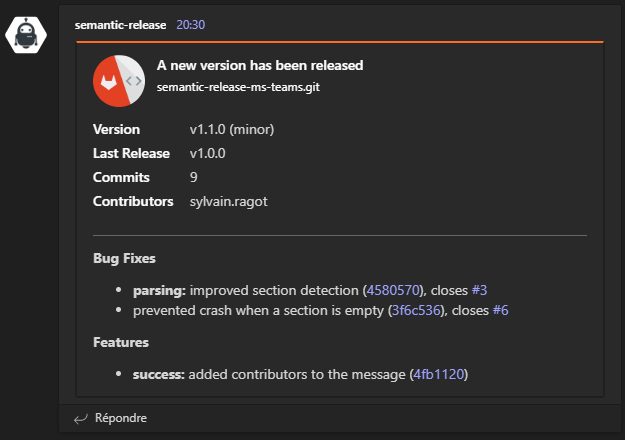semantic-release plugin to send release notes to a Google Chat channel when the release succeeds.
| Step | Description |
|---|---|
verifyConditions |
Check the webhookUrl option or GOOGLE_CHAT_WEBHOOK_URL variable |
success |
Send a Google Chat message to notify of a new release. |
npm install semantic-release-google-chat --save-dev
# or
yarn add semantic-release-google-chat --devThis plugin is using an incoming webhook to notify a Google Chat space. Here is some documentation to create one.
// .releaserc.json
{
"branches": ["main"],
"plugins": [
"@semantic-release/commit-analyzer",
"@semantic-release/release-notes-generator",
["semantic-release-google-chat", {
"webhookUrl": "...",
"title": "A new version has been released",
"imageUrl": "http://...",
"showContributors": false
}]
]
}| Variable | Details | Description |
|---|---|---|
webhookUrl or GOOGLE_CHAT_WEBHOOK_URL
|
required, url | The incoming webhook url of the channel to publish release notes to. |
title |
optional, text | The title of the message. Default: A new version has been released |
imageUrl |
optional, url | An image displayed in the message, next to the title. The image must be less than 200x200. |
showContributors |
optional, boolean | Whether or not the contributors should be displayed in the message. Default: true
|
-
webhookUrlis a property of the config object in.releaserc.json, and,GOOGLE_CHAT_WEBHOOK_URLis an environment variable. The config object can be useful to try the plugin, but most of the time, production environments prefers environment variables. You can use both, but not in the same time as it does not make sense. If you do define both, the config object overrides the environment variable. -
IMPORTANT: The
webhookUrlvariable you can use within your plugin configuration is meant to be used only for test purposes. Because you don't want to publicly publish this url and do let the world know a way to send messages to your Google Chat channel, you will want to use theGOOGLE_CHAT_WEBHOOK_URLinstead. -
The default value for
imageUrlishttps://upload.wikimedia.org/wikipedia/commons/thumb/4/4e/Gitlab_meaningful_logo.svg/144px-Gitlab_meaningful_logo.svg.png
-
The list of Contributors is built using the email associated with the commits (only the part before the "@" is kept). This list can be disable (mainly for privacy reasons).
-
The message is sent to Google Chat during the
successstep which is silenced indryRunmode. -
The official
@semantic-release/gitplugin may cause a second message to be sent (because the plugin potentially adds a commit on the current branch, to save changes in files likepackage.json,package-lock.json,CHANGELOG.md). In order to prevent that, an environment variable (HAS_PREVIOUS_SEM_REL_EXECUTION) is set totrueafter the first message, then this plugin won't send any other message, as long as the plugin is part of the config.
Here are some steps to test the plugin locally:
- checkout the source code:
git clone git@github.com:jontey/semantic-release-google-chat.git cd semantic-release-google-chat npm install - add a
.releaserc.jsonfile at the project's root, copy the code from the Usage section in this new file using thewebhookUrlproperty, and add the following properties in the object:"ci": false, "dryRun": true, - open
index.jsand replacemodule.exports = { verifyConditions, success };bymodule.exports = { verifyConditions, generateNotes: success };to allow the publication within thedryRunmode - run
semantic-releaselocally safely:npm link npm link semantic-release-google-chat ./node_modules/.bin/semantic-release
-
node-fetch: Send the message to Google Chat -
remark: Markdown to JSON -
mdast-util-to-markdown: JSON to Markdown
Greatly inspired by semantic-release-slack-bot and semantic-release-ms-bot
